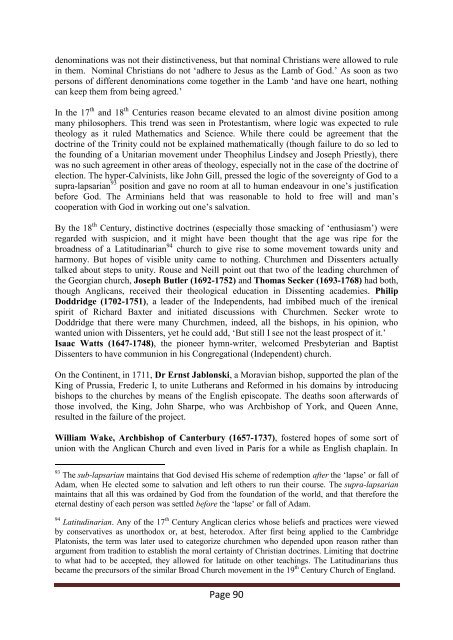Digging Out the Embedded Church - The Maranatha Community
Digging Out the Embedded Church - The Maranatha Community
Digging Out the Embedded Church - The Maranatha Community
Create successful ePaper yourself
Turn your PDF publications into a flip-book with our unique Google optimized e-Paper software.
denominations was not <strong>the</strong>ir distinctiveness, but that nominal Christians were allowed to rule<br />
in <strong>the</strong>m. Nominal Christians do not „adhere to Jesus as <strong>the</strong> Lamb of God.‟ As soon as two<br />
persons of different denominations come toge<strong>the</strong>r in <strong>the</strong> Lamb „and have one heart, nothing<br />
can keep <strong>the</strong>m from being agreed.‟<br />
In <strong>the</strong> 17 th and 18 th Centuries reason became elevated to an almost divine position among<br />
many philosophers. This trend was seen in Protestantism, where logic was expected to rule<br />
<strong>the</strong>ology as it ruled Ma<strong>the</strong>matics and Science. While <strong>the</strong>re could be agreement that <strong>the</strong><br />
doctrine of <strong>the</strong> Trinity could not be explained ma<strong>the</strong>matically (though failure to do so led to<br />
<strong>the</strong> founding of a Unitarian movement under <strong>The</strong>ophilus Lindsey and Joseph Priestly), <strong>the</strong>re<br />
was no such agreement in o<strong>the</strong>r areas of <strong>the</strong>ology, especially not in <strong>the</strong> case of <strong>the</strong> doctrine of<br />
election. <strong>The</strong> hyper-Calvinists, like John Gill, pressed <strong>the</strong> logic of <strong>the</strong> sovereignty of God to a<br />
supra-lapsarian 93 position and gave no room at all to human endeavour in one‟s justification<br />
before God. <strong>The</strong> Arminians held that was reasonable to hold to free will and man‟s<br />
cooperation with God in working out one‟s salvation.<br />
By <strong>the</strong> 18 th Century, distinctive doctrines (especially those smacking of „enthusiasm‟) were<br />
regarded with suspicion, and it might have been thought that <strong>the</strong> age was ripe for <strong>the</strong><br />
broadness of a Latitudinarian 94 church to give rise to some movement towards unity and<br />
harmony. But hopes of visible unity came to nothing. <strong>Church</strong>men and Dissenters actually<br />
talked about steps to unity. Rouse and Neill point out that two of <strong>the</strong> leading churchmen of<br />
<strong>the</strong> Georgian church, Joseph Butler (1692-1752) and Thomas Secker (1693-1768) had both,<br />
though Anglicans, received <strong>the</strong>ir <strong>the</strong>ological education in Dissenting academies. Philip<br />
Doddridge (1702-1751), a leader of <strong>the</strong> Independents, had imbibed much of <strong>the</strong> irenical<br />
spirit of Richard Baxter and initiated discussions with <strong>Church</strong>men. Secker wrote to<br />
Doddridge that <strong>the</strong>re were many <strong>Church</strong>men, indeed, all <strong>the</strong> bishops, in his opinion, who<br />
wanted union with Dissenters, yet he could add, „But still I see not <strong>the</strong> least prospect of it.‟<br />
Isaac Watts (1647-1748), <strong>the</strong> pioneer hymn-writer, welcomed Presbyterian and Baptist<br />
Dissenters to have communion in his Congregational (Independent) church.<br />
On <strong>the</strong> Continent, in 1711, Dr Ernst Jablonski, a Moravian bishop, supported <strong>the</strong> plan of <strong>the</strong><br />
King of Prussia, Frederic I, to unite Lu<strong>the</strong>rans and Reformed in his domains by introducing<br />
bishops to <strong>the</strong> churches by means of <strong>the</strong> English episcopate. <strong>The</strong> deaths soon afterwards of<br />
those involved, <strong>the</strong> King, John Sharpe, who was Archbishop of York, and Queen Anne,<br />
resulted in <strong>the</strong> failure of <strong>the</strong> project.<br />
William Wake, Archbishop of Canterbury (1657-1737), fostered hopes of some sort of<br />
union with <strong>the</strong> Anglican <strong>Church</strong> and even lived in Paris for a while as English chaplain. In<br />
93 <strong>The</strong> sub-lapsarian maintains that God devised His scheme of redemption after <strong>the</strong> „lapse‟ or fall of<br />
Adam, when He elected some to salvation and left o<strong>the</strong>rs to run <strong>the</strong>ir course. <strong>The</strong> supra-lapsarian<br />
maintains that all this was ordained by God from <strong>the</strong> foundation of <strong>the</strong> world, and that <strong>the</strong>refore <strong>the</strong><br />
eternal destiny of each person was settled before <strong>the</strong> „lapse‟ or fall of Adam.<br />
94 Latitudinarian. Any of <strong>the</strong> 17 th Century Anglican clerics whose beliefs and practices were viewed<br />
by conservatives as unorthodox or, at best, heterodox. After first being applied to <strong>the</strong> Cambridge<br />
Platonists, <strong>the</strong> term was later used to categorize churchmen who depended upon reason ra<strong>the</strong>r than<br />
argument from tradition to establish <strong>the</strong> moral certainty of Christian doctrines. Limiting that doctrine<br />
to what had to be accepted, <strong>the</strong>y allowed for latitude on o<strong>the</strong>r teachings. <strong>The</strong> Latitudinarians thus<br />
became <strong>the</strong> precursors of <strong>the</strong> similar Broad <strong>Church</strong> movement in <strong>the</strong> 19 th Century <strong>Church</strong> of England.<br />
Page 90








